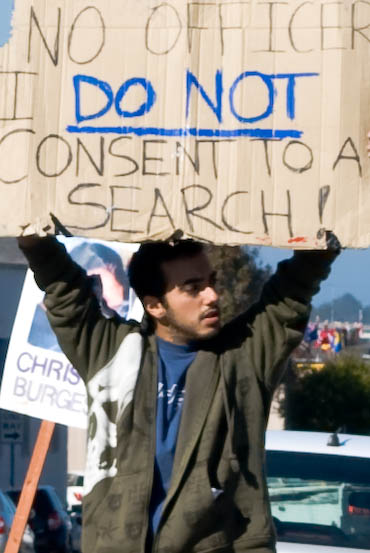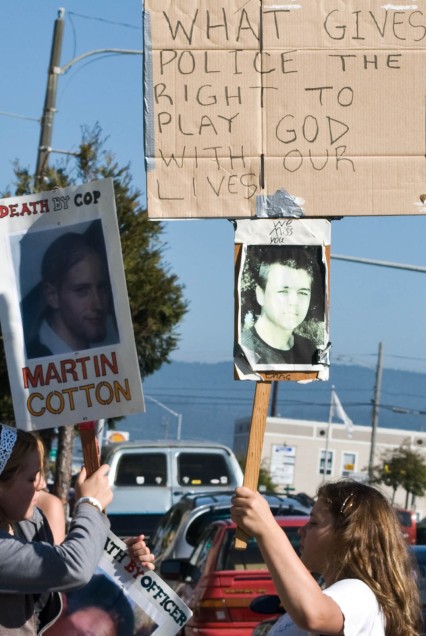Leaders in the Catholic and other conservative pro-life churches are almost making it mandatory this presidential election that the faithful vote for McCain or, more to the point, vote against the pro-abortion Obama. But is this single-issue pro-life exhortation really in harmony with authentic Christian tradition? Are these leaders really showing that they are of the mettle of their predecessors, from the Apostles to St. Thomas Beckett to Cardinal Mindszenty? Or instead are these Christian leaders more aligned with those predecessors who all too often compromised the faith and kowtowed to political power, the world, the flesh, and the devil? This essay advances that it is the latter.
The Pro-Life Ploy
Indeed, the pro-life ploy is perfectly demonic: in holding out the illusionary possibility of destroying an evil an even greater evil is fed. But what can be more evil than killing babies? It is that which is the cause of this killing and myriad other evils. Indeed, as atrocious as abortion is, it is nonetheless a symptom. Our nation is not vicious because it allows abortion, rather it allows abortion because the nation is vicious.
It is good that church leaders are finally showing some spine in regards to politics and the crime of abortion, but this is neither remarkable nor prophetic. In doing so they are merely reacting to the most gruesome and sensational symptom of a systemic evil. But tragically the election of another Republican will not take care of the symptom; at the very best (don’t hold your breath) it will remand it back to the states. Abortion will remain, legal or illegal. However, it is certain that voting for either the Republican or Democratic candidate will strengthen the systemic evil that is the current Republican-Democratic political axis, and the powers that manipulate that government. Also be certain that the last thing the national government wants to do is remand anything back to the states, much less to the community, church, or family. Indeed, Roe v. Wade is the rotten fruit of the Federal government’s usurpation of state’s rights.
The systemic evil that must be primarily combated is the rise of the most omnipotent State in history, both on the domestic and international level. Under this State, and abided by mind-boggling advances in technology, totalitarianism has the potential of reaching an apex of power and control undreamed of by past despots. The future is ominous indeed, for already this State contravenes its own constitution. Already this State ignores international law in its kidnapping and torture of suspects. Already this State justifies its attack of other countries under the immoral concept of pre-emptivity. Already this State has free license to spy on its citizens. Already this State claims the right to intrude itself into the family, even to the extent of confiscating children. Already this State imprisons 1 in every 100 of its citizens, a quarter of the world’s entire prison population. In short, already this State is fascist, viewing itself as omnipotent and beholding to nothing.
While ultimately this unprecedented totalitarian State is an international-united-states, domestically it is the United States of America and is represented by the Republican-Democratic political axis. These political parties are but two sides of the same ticket; a tag team that take turns every four or eight years beating up on the hapless American populace who nonetheless continue to cheer them on with "USA, USA" thinking these parties are actually wrestling each other. Yes, the Democrats and Republicans are two sides to the same ticket: and that ticket is a one-way ticket to fascism. It is the ticket to the attempted destruction of any remnant of authentic Christianity and a ticket to the reign of an antichrist, if not the antichrist. Supporting this regime, this Republican-Democratic axis of evil, is not pro-life; it is pro-death, both physically and spiritually. It will not end abortion, but quite the contrary, it will metastasize the culture of death, killing the bodies of its opponents and the souls of its proponents.
The urgent case in point shows an example of this culture of death. One would think U.S. pro-lifers would care about the Iraqi unborn just as much as they care about other unborn babies. A baby in-utero is neither Christian nor Moslem, neither American nor Iraqi. In Iraq how many unborn have died along with the millions of civilians that have been killed or maimed by the USA’s destruction of infrastructure, aerial bombing, and depleted uranium bombs. These depleted uranium bombs also have the added "military" advantage of causing spontaneous abortions and birth defects. However, I’ve yet to hear one single denouncement of this from the "traditional Catholic" pulpits I frequent, and only extremely rarely from the "Christian pro-lifers" I encounter. Indeed, the pro-life movement’s new found darling, Mrs. Palin, is silent on the Iraqi special needs children debilitated by our special bombs. Of course, Bomb-Bomb-Iran McCain couldn't care less. He is the same fellow who bombed innocent civilians in North Vietnam when Nixon decided to stop risking our own soldier’s lives and concentrate our military efforts on terrorist blanket bombing of North Vietnam population centers. Anyone that supports a candidate that gleefully looks forward to the bombing of innocent civilians (born or unborn, Christian or Moslem) in Iraq, Iran, Afghanistan, and the devil knows where, is not pro-life, and surely not a good Christian!
The Two Party Axis of Evil
"Vote pro-life." If only the battle between good and evil was so simple. But it’s not, for evil is deceptive and insidious. When one becomes myopic and single-issue oriented one is easily hoodwinked, for one’s field of vision is already curtailed. Indeed, he usually becomes blinded to his own personal issues, especially those that require real courage to confront.
Christian pro-life leaders are right, for aside from all the other issues, right or wrong Obama advocates, his abortion stance makes it a very simple and closed case: a Catholic or other pro-life Christian cannot vote for him or his running mate, the apostate Catholic Biden. So it is a no-brainer that one can’t vote for Obama, but it takes only a bit more brains (maybe a bit-of-brains should be a poll requirement) or a smidgen of true Christian spirit to see that one can’t vote for McCain either. An orthodox Christian must hold that voting for any overtly pro-abortion candidate is intrinsically evil. But so is voting for a totalitarian warmonger like McCain, though it seems that only wise or authentic or uncompromising Christians realize this.
The Christian single-issue advocates are in effect, if not always in intent, minimalists and compromisers. What they are urging is what a functional conscience with but the slightest sense of natural law and moral rectitude would urge. These single-issue Christians fail to see the bigger picture, the essence of the evil itself, because they compartmentalize their faith. It is safer than living that faith out in its totality and it is safely political and issue-oriented rather than dangerously militant and prophetic. Being pro-life becomes militant and prophetic, it becomes heroic and a personal encounter with Christ Crucified, most especially for those who endure a pregnancy that is somehow tragic. But for most of us being pro-life remains an issue, even the banner issue of our conservative politics and our Christian faith.
But Christianity can’t be reduced down to issues or politics. It isn’t liberation theology nor neo-conservatism nor dispensationalism, all of which fall under the category of a semi- or anti-Christianity. Not only is Christianity not merely political, it is not merely moral. You can’t reduce the faith down to a moral code much less one moral position, no matter how serious that position is. To do so does irreparable damage to that faith and, as such, best assures the defeat of the moral position one advocates.
Christianity is much more than politics or morals: it is a fully integral, all pervasive, all transcendent though eminently practical worldview. Both parties on the vast majority of issues, on their all-pervasive worldviews, are incompatible with, indeed hostile to, the Christian worldview. Thus there are many other issues that disallow a Christian from voting for either Obama even if he were pro-life or McCain even though he claims to be pro-life. True, one could be more easily deceived and not know that a vote for McCain is a vote for that which is antithetical to Christianity; but isn’t such deception in keeping with the insidious tactics of the demonic?
Means and Ends
In traditional Christian morality a good end never justifies an evil means, and even if it did an evil means never procures a good end that lasts. A strikingly relevant case in point was the Fascist government in Italy. Mussolini’s state banned abortion, birth control, and homosexuality activity. As a Catholic I hold these things as intrinsically evil and their curtailment good. However, supporters of Italian fascism, even those who supported it primarily for the advancement of these moral issues, are responsible for facilitating a cataclysmic evil. This evil culminated in Catholics sheepishly submitting to national conscription and participation in an unjust and horrifying war. In addition, it led to the subsequent weakening of Catholic culture, morals, and faith in Italy and to the final eradication of European Christendom. The result now being a de-Christianized Italy that fully accepts those very moral issues some sought to address by compromising with the fascist regime. If even a fraction of the effort and sacrifice that was squandered by Italian and other Catholics in World War II had instead been brought to missionary efforts the world would be looking at the rebirth of Christendom rather than its demise.
Moral decadence always comes in the wake of war. Indeed among Catholic countries, erstwhile totalitarian Italy and Spain have the lowest birthrates in the world due to rejection of the Church’s moral teachings on sexuality and marriage. Compare this to the erstwhile victims of totalitarianism, Ireland and France, which still have the highest birthrates. The lesson being, you can’t compromise with a totalitarian regime even for a single issue, for that issue, along with a host of others, will only be gravely exacerbated in the long run.
Catholic weren’t so taken in by the blatantly pagan Nazi movement and the Catholic regions of Germany remained the last bastion of opposition to it. Indeed, Catholics biggest weakness in regards to Nazism was tolerating it because it wasn’t as blatantly atheistic as Communism. Today Catholics and other pro-life Christians are asked by their clergy to tolerate McCain and the Republicans to avoid Obama and the Democrats. This tactic is akin to supporting Communism to destroy Nazism. However in this case the chances of eradicating the evil of abortion are zilch. Just as there was little difference between the Communists and the Nazis there is even littler difference between the American Axis of the Republicans and Democrats. They are both socialist and totalitarian. Indeed, it is a hoax being played on the American people to make them believe there is a difference. Unfortunately for a people raised on TV and other fantasies this hoax is easily perpetrated.
There is a Unifying Issue
We have abortion because of the break-up of the family and the ensuing moral decadence, not because of Roe v. Wade. Why do we have the breakup of the family? It is because the family has been supplanted by the State (and the corporation). In actuality families have absolutely no rights in the United States, indeed, children can be taken from the home on mere suspicions. Yet it is the family that is ever the last bastion against tyranny.
Christians must realize that the evil of abortion, like all moral evils, will only be eradicated when the populace converts from its neo-paganism. This is the job of the Church, not the current government, which itself is neo-pagan in its self-worship. Indeed, there is an indisputable correlation between the waxing of the State and vice and the waning of the family and virtue. As the State becomes more totalitarian its citizens become more vicious and as the citizens become more vicious the State becomes more totalitarian. Thus to end abortion we must defeat the totalitarian State and increase personal virtue. The most effective way of increasing personal virtue is to restore the sacrosanct status of the family. A strengthened family plus a weakened State equals a moral virtuous populace equals less abortion.
Note well that patriotism is not nationalism. Patriotism is a virtue, nationalism is a vice. Love of one’s soil, one’s family, one’s clan, one’s (in some way) homogeneous community is the essence of patriotism. But nationalism, and more so today than ever, undermines all of that. The central principle of traditional Christian social thought is subsidiarity. Subsidiarity holds that all social and governing functions should be implemented at the most local level possible. Thus the locus of authority should be the family, then the neighborhood, and then the community; as opposed to the State. It’s Dad’s responsibility and competency to police Junior not Officer Storm Trooper’s. In other words, the Christian principle of subsidiarity upholds regional rights, community rights, and family rights! It holds that the State (and even the police!) exists to serve the citizen and the family.
This cause of family, of community, and region – of subsidiarity – against the totalitarian State is the closest Christians have to a single issue. More exactly it is the unifying issue because all else flows both in morals and politics from this. Thus Christians should be fighting tooth and nail against the omnipotent national government, which means they should be in militant opposition to either major party, to either Obama or McCain, which are puppets of the State.
The Good Means to the Lasting Ends
The end of abortion is not a quick fix. It has taken 500 years for Christendom to be unraveled completely and it may take another 500 years, if God so wills it, for a new Christendom to fully arise. This rebirth entails a moral and spiritual dynamics, not a political and judicial one. For a Christian the most evil element of abortion is the mortal sin of the perpetrators – not the death of the infant, as sorrowful as that is. It is the spiritual death of this country and the choking out of authentic Christianity that is the essential evil we must confront. It wouldn't matter if all abortions were outlawed tomorrow, abortion would still remain and the evil that emanates from a decadent populace and an omnipotent state would continue to increase.
Fight abortion not by feeding the State leviathan so it can gobble up the saved unborn 18 years later in a draft or sooner in some other form of indentured servitude or indoctrination or incarceration; but rather by strengthening the autonomy of the family, the community, and the natural and sociological regions of this country. Fight abortion by reestablishing the sacrosanct status of the home, which is itself the womb of community and Christianity. Fight it by being uncowed by the police state. Fight it by rejecting legal positivism, the ideology that holds that just because the state declares something to be legal or illegal it is. Fight it by studying truth, especially the ancient truth of our Western Christian civilization. Fight it by becoming virtuous and holy. Fight it by heroically preaching the Gospel in lifestyle and words. Fight it by the prophetic witness even if it includes "civil disobedience." Fight it by being open to life and valuing of all human life even when those lives are deemed to be "enemies" or "non-persons" by the state. Fight it by establishing families united in sacrosanct indissolubility. Fight abortion by fighting the ungodly regime in Washington that rapaciously seeks to supplant both faith and family.
Conclusion
Dear Christians, refuse to offer a pinch of incense by refusing to punch the ballot for either official Republican-Democratic Axis candidates. Refuse to offer tribute to the gods of American socialism, totalitarianism, and imperialism and their incarnation in the president. Resist participation in this sham election. The USA is the most powerful and hence the most dangerous nation in the history of the world. Its potential for evil is absolutely unprecedented. If there is not a reversion to the constitution then totalitarianism is inevitable. If this reversion does not occur the only hope for our country will be in those willing to give their lives as witnesses to Christ against the antichrist of the State. Whoever occupies the Whitened Sepulcher House this January is a tool of the powers and principalities of this world and of the devil. And all who facilitate the legitimacy of this sham election are, at best, the devil’s dupes, at worst his minions.
October 23, 2008
G.C. Dilsaver [send him mail] is a clinical psychologist and director of Imago Dei Clinic in Harrisburg, PA. Dr. Dilsaver works with therapants both face-to-face and telephonically from throughout the country who are seeking an efficacious alternative to psychotropic medication and mainstream psychotherapy.























